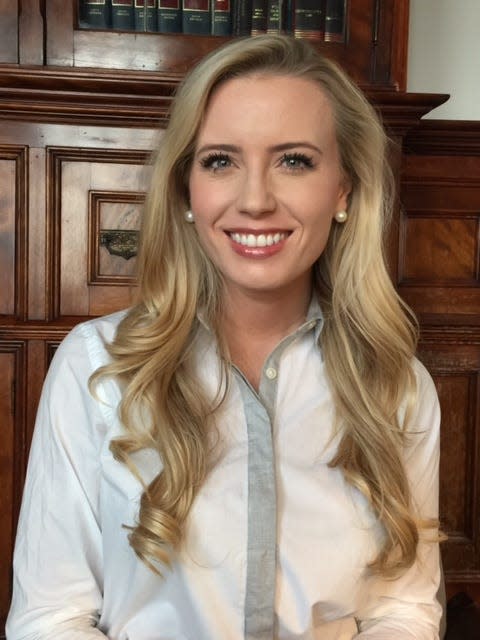Feeling sad, lonely? Making friends as an adult is hard. Your front porch can help.
In a recent essay for The Atlantic, "How America Got Mean," David Brooks argues that our fellow citizens are both overwhelmingly sad and angry − to the point that being rude and downright mean to one another is the everyday norm.
Brooks writes: "We’re enmeshed in some sort of emotional, relational, and spiritual crisis, and it undergirds our political dysfunction and the general crisis of our democracy."
It's an important and interesting assessment of our society, and Brooks has ample evidence to support his opinion. But is his diagnosis entirely correct? And can any generalization about such a culturally and geographically diverse nation of 332 million people truly capture the nuances and contradictions of life in America in 2023?
In my book, "The Soul of Civility: Timeless Principles to Heal Society and Ourselves," scheduled for release in October, I explore concerns about belonging, human flourishing and the challenges to the joint partnership of life together in our nation.
One thing I discovered in my research is that it's not new for commentators, like Brooks, to decry the state of a society's manners.
We have more in common than you think: I walked from D.C. to NYC, and found my faith in America restored along the way
Concern about social decline is an ancient fear
What has been called the oldest book in the world – dated to the late 25th and early 24th centuries B.C. in Egypt – is a civility handbook. Pharaoh’s adviser Ptahhatp was prompted to write the guide, featuring maxims for human flourishing, out of his concern that Egyptian life had become intolerably rude.
So the challenge of how to live together with others across our differences is timeless.
Yet, Brooks notes that Americans are statistically sadder and ruder now than in past eras. He's right to link those trends. “Hurt people hurt people” is a cliché because it is true.
But what Brooks missed in his diagnosis of modern American life are the many people who are working to counter meanness with empathy, loneliness with being a good neighbor.
America has a 'loneliness epidemic': Government can't solve our 'loneliness epidemic,' but we can. It's easier than you think.
Consider, for example, my friend Joanna Taft, executive director of the Harrison Center for the Arts in Indianapolis. Joanna is an active leader in what I call "the porching revolution."
Five years ago, soon after my husband and I moved from Washington, D.C., to Indianapolis, Joanna offered me an unexpected invitation.
“I’m Joanna,” she said. “Would you like to porch with us sometime?”
It was the first time I had ever heard the word “porch” used as a verb. But I soon learned that for Joanna, "porching" is about actively seeking to revive community, to build friendships and to learn together that the things that seem to divide us as neighbors aren't as important as those that bind us.
In Joanna's model of community engagement, the porch becomes a neutral place where people of different backgrounds can meet and befriend one another.
A century ago, before air conditioning and Netflix kept Americans occupied behind closed doors, it was common for homes to feature large front porches, where families gathered in the evening to talk and play and where waving at and chatting with neighbors and strangers made a statement about commitment to community.
In time, families' outdoor gathering spaces moved behind their homes, with backyard decks and patios, screened from the neighbors by privacy fences, now common.
The architectural shift tracks with a cultural one – individualism has replaced community. And with greater individualism come the loneliness and meanness that Brooks bemoaned in his essay.
All the lonely people: Why Americans' isolation is a threat to our democracy
How my friend is fighting America's epidemic of loneliness
Observing her neighbors' social isolation, Joanna rebelled. And her front porch became her countercultural tool of choice to connect with guests from a diverse set of life experiences and opinions.
In doing so, she is helping her community combat the epidemic of loneliness and sadness that plagues many of our neighbors.
Opinion alerts: Get columns from your favorite columnists + expert analysis on top issues, delivered straight to your device through the USA TODAY app. Don't have the app? Download it for free from your app store.
Joanna understands that porching isn't a panacea. But she focuses on what she can control by cultivating her porch as a haven from the hurriedness and hurt that define much of contemporary life.
Her porch is a place where those who differ politically, racially and culturally can begin to form bonds of friendship and trust and to feel seen, known and loved. Her revolution against our atomized and fractured society is one that many more of us can be a part of, if we choose connection over isolation.
It's important to note that it's not about the porch. It's about people. You can decide to connect with your neighbors whether you live in a high-rise apartment or a cabin in a forest, a suburb or a small town.

How do we join Joanna's rebellion? We can start by inviting others with different opinions, experiences and walks of life around our table, onto our real or metaphorical porch, and into our lives.
Yes, as Brooks notes, there are more than enough sad and mean people in America today. But that's far from everyone, as my friend Joanna well knows.
Will you join us on the porch? There's enough room for everyone.
Alexandra Hudson is author of a soon-to-publish book, "The Soul of Civility: Timeless Principles to Heal Society and Ourselves."
You can read diverse opinions from our Board of Contributors and other writers on the Opinion front page, on Twitter @usatodayopinion and in our daily Opinion newsletter.
This article originally appeared on USA TODAY: Why are Americans so rude? We binge Netflix instead of making friends
